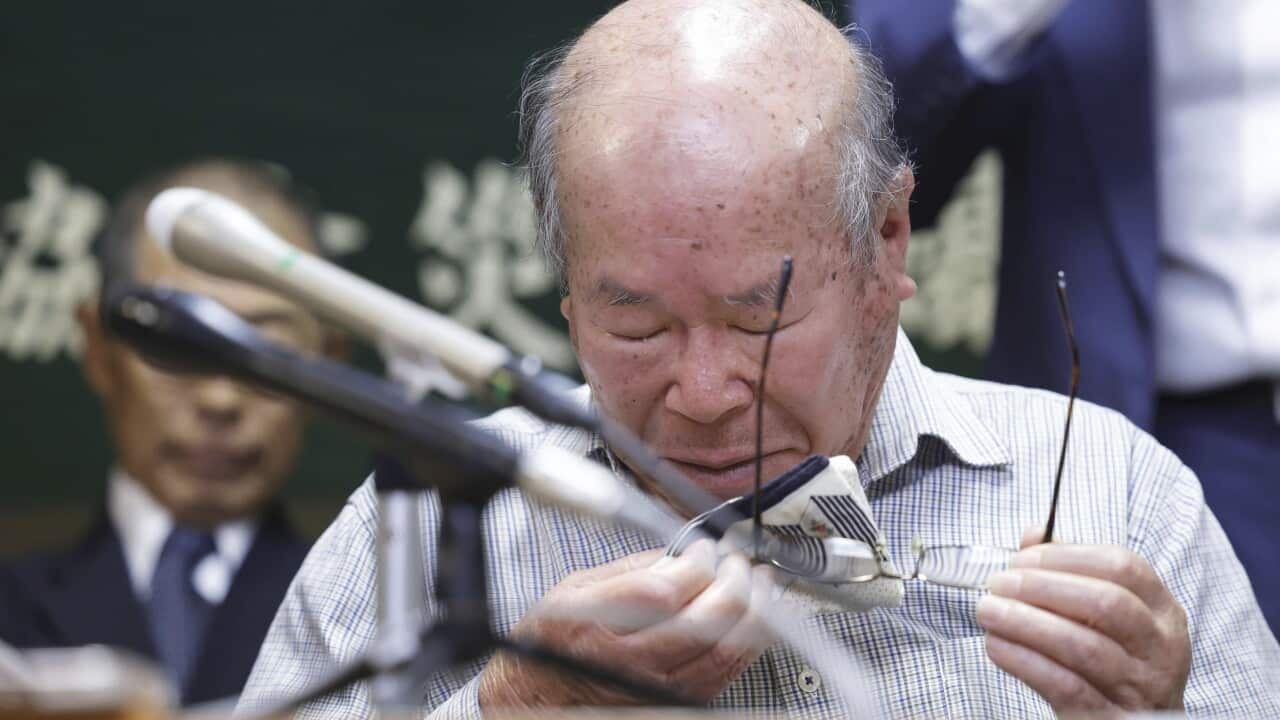TRANSCRIPT
The phone has been ringing non-stop from well-wishers with messages of congratulations, since the announcement that the 2024 Nobel Peace winner is the Japanese organisation, Nihon Hidankyo.
The grassroots movement represents the survivors of the only two nuclear bombs ever to be used in conflict.
Masako Wada, a representative from Nihon Hidankyo and a survivor herself, says she had thought the organisation were close to winning in previous years, but it didn't happen - so she was surprised to hear the news.
"I didn't expect this big surprise, the dream came true. I'm afraid I had a cold. So I visited a doctor and I got some medicine and on my way home I got a telephone call from one of the press. So I didn't believe, I couldn't believe the news (when I heard it). I thought: is that true?"
The survivors of the atomic bombing of Hiroshima and Nagasaki by the United States at the end of World War are k nown as hibakushas, which translates to bomb-affected-people in Japanese.
Around 140,000 people died following the bombing in Hiroshima on August 6, 1945 - and 74,000 others in Nagasaki three days later.
In the 79 years since the life-changing events, they have dedicated their lives to the struggle for a nuclear-free world.
Many of the hibakushas have since died, and those still alive have encountered health problems and stigma over the decades of their advocacy.
Nihon Hidankyo was formed in 1956 by the survivors - amid demands for government support for health problems.
Ms Wada says it has been her life's work to raise the alert about the nuclear risks today - and as far as she's concerned, there's still more work to be done.
"We have been trying to tell the story about the humanitarian consequences if the A-bomb used the third time. So we have to stop. We have to cease that risk. First of all, we have to persuade... we have to talk with our (Japanese) government to join the ban treaty (UN treaty banning nuclear weapons). So the world is currently moving backward on nuclear disarmament. The Russian invasion has caused unspeakable human suffering and raised the risk of nuclear war. Rather than anger, I felt sorrow and fear how deep humans will fall into the darkness. We have to keep going forward. To convey our wish, our hope."
In making the announcement, Nobel committee chair Jørgen Watne Frydnes says the work of Nihon Hidanky has been impactful - and their message still resonates today amid growing nuclear threats by Russia and Iran.
Mr Frydnes says it is also a strong embodiment of the request left in the will by the award's founder, by Alfred Nobel, for the peace prize to be awarded to those who, during the preceding year, shall have conferred the greatest benefit to humankind.
"Gradually, a powerful international norm developed, stigmatising the use of nuclear weapons as morally unacceptable. This norm has become known as the nuclear taboo. The testimony of the Hibakusha, the survivors of Hiroshima and Nagasaki is unique in this larger context. These historical witnesses have helped to generate and consolidate widespread opposition to nuclear weapons around the world by drawing on personal stories, creating educational campaigns."
The front-runners before the announcement of this year's winner included: the International Court of Justice, the UN agency for Palestinian refugees UNWRA, and the UN Secretary General Antonio Guterres.
Dr Lukasz Swiatek, at the University of New South Wales, has done academic research on the Nobel Peace Prize.
He says this year's winner was unexpected, but well received.
"I think the choice is also very significant because it highlights the role that civil society, so in other words - individuals and groups at the grassroots levels - can play in international peace. So Nihon Hidankyo has been doing wonderful work in trying to spread the message of the dangerousness of nuclear weapons for quite a long time. And that message trickling down to individuals and groups outside of governments can end up playing a really important role in world peace efforts."
The UN's high representative for disarmament affairs, Izumi Nakamitsu, congratulated the Nihon Hidankyo , saying she has been inspired by the courage and advocacy of the survivors.
She says nuclear disarmament remains a top priority for the United Nations.
"The work of the hibakushas and Nihon Hidankyo is really focusing on rather than looking back, make sure that we will not make new hibakushas. Their slogans are that Nagasaki really has to be the last place on Earth to suffer this kind of inhumane weapons. And further, they have actually focused on, you know, peace and reconciliation. So in their spirit, I think we need to really focus on how to make sure that their wishes are actually going to be achieved. From my own perspective of the UN High Representative for Disarmament, it is also about the security of humankind. I still hope that no one, no states will intentionally use nuclear weapons. But the risks of miscalculation, misunderstanding leading to a potential use of nuclear weapons is unacceptably high at the moment. And therefore, if we want to eliminate the risks associated with nuclear weapons, the only way to really eliminate the risk is to eliminate nuclear weapons themselves."
It is the second Nobel Peace Prize for a Japanese recipient in the prize's 123-year history, coming 50 years after former Prime Minister Eisaku Sato won it in 1974.
The Nobel Peace Prize is worth 11 million Swedish crowns, or about $1.57 million Australian dollars.
The formal award ceremony will be held in Oslo on December 10.













